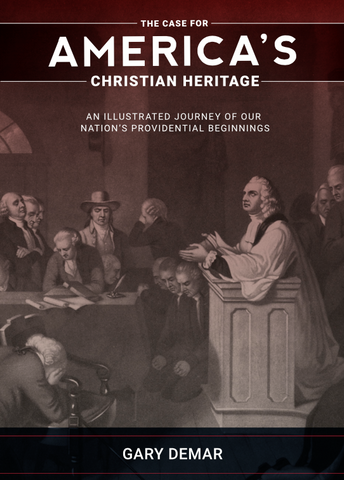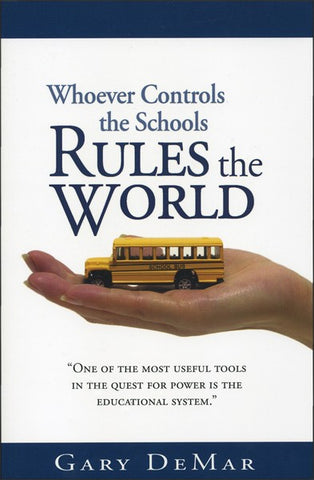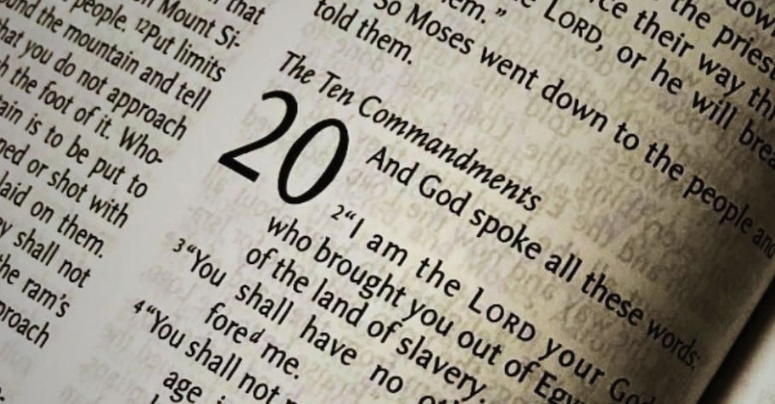The state of Louisiana has determined that the Ten Commandments (Decalogue/Ten Words: Ex. 34:28),[1] will be posted in Public School Classrooms. The usual and unusual subjects have voiced their opposition. First, the usual subjects, that is, “The American Civil Liberties Union, the American Civil Liberties Union of Louisiana, Americans United for Separation of Church and State, and the Freedom from Religion Foundation announced … that they will file suit to challenge a new Louisiana law that requires all public elementary, secondary, and postsecondary schools to display the Ten Commandments in every classroom.”
Not to be outdone, the unusual suspect, supposed conservative and Evangelical Christian David French got into the act by criticizing the action by the governor. Gov. Jeff Landry of Louisiana said, “I can’t wait to be sued.” French noted that the Supreme Court previously ruled against mandatory displays of the Ten Commandments in public school classrooms. This means Louisiana is defying the 1980 Supreme Court case Stone v. Graham that struck down a Kentucky law that required the posting of the Ten Commandments. French went on to write:
“If you want to respect the rule of law,” Landry told the guests [at a Republican fundraiser], “you’ve got to start from the original lawgiver, which was Moses.” French then asked, “To teach respect for the rule of law, he’s defying the Supreme Court? That’s an interesting message to send to students.”
It’s important to note that Moses was not the original lawgiver. God is the original lawgiver. There are no commandments without God. This means that it’s about more than the Ten Commandments.
One way to challenge a ruling by the Supreme Court is to make a case against a previous ruling. The Supreme Court has changed since 1980. The 1973 Rove v. Wade pro-abortion decision was overturned in the 2022 Dobbs decision. The states now have jurisdiction on the abortion issue. The same should be true for the Ten Commandments. Of course, the National Government should be bound by the Ten Commandments including forbidding women to kill their unborn children. If abortion is killing unborn babies, then even the states should be prohibited. God and His commandments are the issue. As I will show, God and His commandments have been woven into the warp and woof of our nation. For example, the Constitution acknowledges the Christian day of rest in the constitutional “Sundays excepted” phrase (Article I, Section 7, Clause 2). Also, there is no Sunday mail delivery.[2] The Constitution assumes an existing moral order. Darwinism killed any semblance of any kind of higher law. It even killed what was left of Natural Law.
Based on the Ninth and Tenth Amendments, the Supreme Court does not have jurisdiction over education (the word “education” is not found in the Constitution). The First Amendment was designed to keep Congress from establishing a religion or prohibiting the free exercise of religion. Again, without God, all religions are on the same footing. But we can’t have competing religions, so the State and its Courts eliminate all religions and establish Statism as the only acceptable religion.

The Case for America's Christian Heritage
It’s not enough, however, to relive history. There’s much work before us to reset the foundation stones of a firm reliance on Divine Providence. We need to heed the words of Benjamin Franklin who quoted Psalm 127:1 during the drafting process of the Constitution: “except the Lord build the house they labor in vain that build it,” and “that without His concurring aid we shall succeed in this political building no better, than the Builders of Babel.” The principles that were true and necessary centuries ago for building nations are equally true and necessary today.
Buy NowThese closing comments by French show how out of touch he is with the imposition of State-mandated commandments of secularism.
Altering constitutional law is not the only motivation here; a version of Christian mysticism is also in play. There is a real belief that the Ten Commandments have a form of spiritual power over the hearts and minds of students and that posting the displays can change their lives.
For French, posting a summary of God’s Law is “a version of Christian mysticism.” To avoid competition among various religious views, the State must intercede. Only its laws are permissible. Controlling education became a power grab by secularists and the imposition of Statist Law. French continues.
I’m an evangelical Christian who believes in God and the divine inspiration of Scripture, but I do not believe that documents radiate powers of personal virtue.
Does his view of “documents” include the Bible? The Bible might disagree with French’s assertion:
For the word of God is living and active and sharper than any two-edged sword and piercing as far as the division of soul and spirit, of both joints and marrow, and able to judge the thoughts and intentions of the heart (Heb. 4:12).
Documents don’t radiate powers of personal virtue, but they are a guide for personal virtue. If the Ten Commandments have no impact on people, as French claims, then why did God mandate them and many other laws? God gave us laws to govern our lives. They serve as moral guardrails. “The law is good, if one uses it lawfully” (1 Tim. 1:8). God’s law tells us when we are loving our neighbors (Rom. 13:8-10). “[T]he Law has become our tutor to lead us to Christ, so that we may be justified by faith” (Gal. 3:24). The Law is a constant reminder that we need Jesus.
The Bible is filled with examples of people who violated God’s laws and the consequences that followed. Deuteronomy 28 and Leviticus 26 are timeless examples of what happens when nations violate God’s law. The lives of David and Solomon are examples of civil rulers rejecting God’s commandments.
The commandments are not enough. Questions arise: Whose commandments are they, why should I obey, what happens when I don’t obey, and is there a remedy for falling short? Students might and should ask these questions. Do we want pagan teachers answering these questions? We are back to the more fundamental question: Should governments control education? No. Should Christians be sending their children to government schools? No.

Whoever Controls the Schools Rules the World
It's been said that "the philosophy of the classroom in this generation will be the philosophy of life in the next generation." Our earliest founding fathers understood this. That's why, after building homes and churches, they established educational institutions like Harvard, Yale, Columbia, and Dartmouth. Over time, most Christians have adopted the false premise that facts are neutral. They believe it doesn't matter who teaches math, science, and history, because facts are facts. The humanists took advantage of this type of thinking by gradually shaping and controlling education in terms of materialist assumptions.
Buy NowWithout God, there are no fixed moral laws. Neither the coldness of the cosmos nor our DNA are moral guides. They don’t tell us anything about right or wrong. Rejecting God and His laws means that some other law will fill the moral vacuum and serve as a savior. In the case of public (government) education, the State is God, and in this God we trust as a nation. There’s no neutrality. The State implements its own version of divine law where Statist virtue is defined and mandated. Harold O. J. Brown asks it this way:
If there are no laws made in heaven, by what standards should human society organize itself? We do need laws by which to organize and structure our lives, but if God has not given them, where shall they come from? There is only one answer: We must make them ourselves. Of course, if we make our own laws they will have no more authority or force than what we ourselves possess and can assert by means of the power at our disposal. In other words, law comes to represent not the will of the Creator but the will of the strongest creatures. This became the widespread view, sometimes unexpressed but frequently explicit, of most Western societies in the first part of the twentieth century.
America’s great legal statesman, Oliver Wendell Holmes Jr., thought no differently in this respect from the real dictator, Adolf Hitler. Both of them believed that laws simply represent the will of the dominant majority. Holmes was a courteous, urbane, sophisticated gentleman, but his idea of law would have offered no opposition to the enactments of Hitler, who for a time reflected the will of Germany’s dominant majority.[3]
French goes on to make this absurd observation:
I happened to grow up in Kentucky and went to classes before the Ten Commandments were ordered removed, and I can testify that the displays had no impact on our lives. My classmates and I were not better people because of the faded posters on the walls.
God gave commandments, and for many people in Israel they had no impact on their lives (1 Cor. 10:1-11). The result? Judgment! The fall of nations. The principles of the Ten Commandments and their remedy when people fail from obeying them were found in the redemptive work of Jesus Christ. This was true from our nation’s founding. Consider the New-England Primer:
The Primer’s principle objective was to teach America’s youth to read, specifically to read the Bible. It imparted biblical principles through multiple tools, including elementary rhymed alphabets, alphabet lessons drawn from scriptural texts, biblical passages (such as the Ten Commandments, “The Lord’s Prayer,” and the Golden Rule), Christian creeds (such as the Apostles’ Creed) and catechisms (such as the Westminster Assembly’s “Shorter Catechism”), and miscellaneous prayers, hymns, poems, and other devotional and didactic material. Its biblical content was so pervasive that it has been called “The Little Bible of New England”; indeed, one scholar described it as “the ultimate abbreviated children’s version of the Old Testament.”
*****
The Scriptures contain explicit legal codes. The Decalogue is the most influential of these codes (Exodus 20:3-17; Deuteronomy 5:7-21), and early colonists apparently framed their legal codes with a copy of the Ten Commandments before them.[4]
U.S. Congressman and Revolutionary soldier William Findley (1741-1821) stated that “[I]t pleased God to deliver on Mount Sinai a compendium of His holy law and to write it with His own hand on durable tables of stone. This law, which is commonly called the Ten Commandments or Decalogue, … is immutable and universally obligatory … [and] was incorporated in the judicial law.”
President John Quincy Adams declared the following:
The law given from Sinai was a civil and municipal as well as a moral and religious code; it contained many statutes … of universal application—laws essential to the existence of men in society, and most of which have been enacted by every nation which ever professed any code of laws. … Vain, indeed, would be the search among the writings of profane antiquity … to find so broad, so complete and so solid a basis for morality as this Decalogue lays down.[5]
The Ten Commandments has been that fixed summary standard in America since its founding. As Nightline host Ted Koppel stated in a 1987 commencement address at Duke University, “What Moses brought down from Mt. Sinai were not the Ten Suggestions. They are commandments. Are, not were. The sheer brilliance of the Ten Commandments is that they codify in a handful of words acceptable human behavior, not just for then or now, but for all time. Language evolves. Power shifts from one nation to another. Messages are transmitted with the speed of light. Man erases one frontier after another. And yet we and our behavior and the commandments governing that behavior remain the same.”[6]
God’s commandments prevailed in the home, church, synagogue, governments, courts, and schools. There was a consensus that these laws were good for our nation. This is no longer the case. God’s law needs to be taught at home and in churches and schools. We need to be responsible for the moral education of our children. The health of the nation depends on it. Statist education and the culture it creates are an inevitable road to ruin.
[1] “The Septuagint translation (LXX, 3rd cent. B.C.E.) of Exodus renders עֲשֶׂרֶת הַדְּבָרִים as ‘the ten words/statements’ (tous deka logous; τοὺς δέκα λόγους). LXX to Deuteronomy 10:4 renders it identically. In Deuteronomy 4:13, however, the translator uses the synonymous ‘the ten words’ (ta deka rhêmata; τὰ δέκα ῥήματα). Josephus (37 CE–ca. 100 CE) also refers to them using the term logos, ‘word/statement.’ While he does not call them ‘the ten statements,’ Josephus does label each of them with ordinal numbers: ‘the first statement (logos) …; the second…” Josephus, Antiquities 3.91 [3.5.5]; in Josephus, Antiquities: Books 1-3, trans. H. St. J. Thackeray, Loeb Classical Library (Cambridge, MA: Harvard University Press, 2001). https://www.thetorah.com/article/the-decalogue-ten-commandments-or-ten-statements
[2] “Near the turn of the century, religious leaders once again sensed the need for greater observance of Sunday sacredness, and pushed for legislation that would prohibit various types of work on Sunday. On August 24, 1912, President William Taft signed H.R. 21279 (Mann) into law, closing all post offices on Sundays an introducing a six-day work week for postal clerks and letter carriers. The bill provided “that hereafter post offices . . . shall not be opened on Sundays for the purpose of delivering mail to the public.” American State Papers and Related State Papers on Freedom in Religion, compiled and annotated by William Adison Blakeley, Published for the Religious Liberty Association by the Review and Herald, Washington, D.C., 1949, 273.
[3] Harold O. J. Brown, The Sensate Culture: Western Civilization Between Chaos and Transformation (Dallas, TX: Word, 1996), 88.
[4] Daniel L. Dreisbach, Reading the Bible with the Founding Fathers (New York: Oxford University Press, 2017), 36, 44.
[5] John Quincy Adams, “From John Quincy Adams to George Washington Adams” (January 10, 1813).
[6] Ted Koppel, The Last Word, Commencement Address at Duke University, Durham, North Carolina (May 10, 1987). Quoted in Robert H. Bork, The Tempting of America: The Political Seduction of the Law (New York: The Free Press, 1989), 164.

